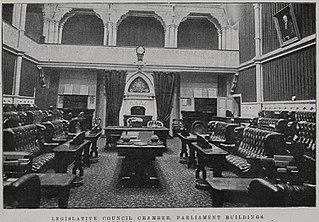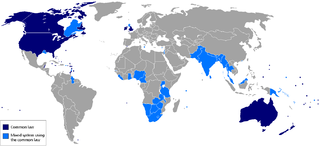
New Zealand is divided into sixteen regions for local government purposes. Eleven are administered by regional councils, and five are administered by unitary authorities, which are territorial authorities that also perform the functions of regional councils. The Chatham Islands Council is not a region but is similar to a unitary authority, authorised under its own legislation.

The prime minister of New Zealand is the head of government of New Zealand. The incumbent prime minister, Christopher Luxon, leader of the New Zealand National Party, took office on 27 November 2023.

The New Zealand Parliament is the unicameral legislature of New Zealand, consisting of the Sovereign (King-in-Parliament) and the New Zealand House of Representatives. The King is usually represented by his governor-general. Before 1951, there was an upper chamber, the New Zealand Legislative Council. The New Zealand Parliament was established in 1854 and is one of the oldest continuously functioning legislatures in the world. It has met in Wellington, the capital of New Zealand, since 1865.

ACT New Zealand, also known as the ACT Party or simply ACT, is a right-wing, classical-liberal political party in New Zealand. It is currently led by David Seymour, and is in coalition with the National and New Zealand First parties, as part of the Sixth National government.

The House of Representatives is the sole chamber of the New Zealand Parliament. The House passes laws, provides ministers to form Cabinet, and supervises the work of government. It is also responsible for adopting the state's budgets and approving the state's accounts.

The Dominion of New Zealand was the historical successor to the Colony of New Zealand. It was a constitutional monarchy with a high level of self-government within the British Empire.
The Reserve Bank of New Zealand is the central bank of New Zealand. It was established in 1934 and is currently constituted under the Reserve Bank of New Zealand Act 2021. The governor of the Reserve Bank, currently Adrian Orr, is responsible for New Zealand's currency and operating monetary policy.

The monarchy of New Zealand is the constitutional system of government in which a hereditary monarch is the sovereign and head of state of New Zealand. The current monarch, King Charles III, acceded to the throne following the death of his mother, Queen Elizabeth II, on 8 September 2022 in the United Kingdom. The King's elder son, William, Prince of Wales, is the heir apparent.
Time in New Zealand is divided by law into two standard time zones. The main islands use New Zealand Standard Time (NZST), 12 hours in advance of Coordinated Universal Time (UTC) / military M (Mike), while the outlying Chatham Islands use Chatham Standard Time (CHAST), 12 hours 45 minutes in advance of UTC / military M^ (Mike-Three).

The New Zealand Legislative Council was the upper house of the General Assembly of New Zealand between 1853 and 1951. An earlier arrangement of legislative councils for the colony and provinces existed from 1841 when New Zealand became a colony; it was reconstituted as the upper house of a bicameral legislature when New Zealand became self-governing in 1852, which came into effect in the following year.

New Zealand nationality law details the conditions by which a person is a national of New Zealand. The primary law governing these requirements is the Citizenship Act 1977, which came into force on 1 January 1978. Regulations apply to the entire Realm of New Zealand, which includes the country of New Zealand itself, the Cook Islands, Niue, Tokelau, and the Ross Dependency.
A municipal corporation is the legal term for a local governing body, including cities, counties, towns, townships, charter townships, villages, and boroughs. The term can also be used to describe municipally owned corporations.

The constitution of New Zealand is the sum of laws and principles that determine the political governance of New Zealand. Unlike many other nations, New Zealand has no single constitutional document. It is an uncodified constitution, sometimes referred to as an "unwritten constitution", although the New Zealand constitution is in fact an amalgamation of written and unwritten sources. The Constitution Act 1986 has a central role, alongside a collection of other statutes, orders in Council, letters patent, decisions of the courts, principles of the Treaty of Waitangi, and unwritten traditions and conventions. There is no technical difference between ordinary statutes and law considered "constitutional law"; no law is accorded higher status. In most cases the New Zealand Parliament can perform "constitutional reform" simply by passing acts of Parliament, and thus has the power to change or abolish elements of the constitution. There are some exceptions to this though – the Electoral Act 1993 requires certain provisions can only be amended following a referendum.

The governor-general of New Zealand is the viceregal representative of the monarch of New Zealand, currently King Charles III. As the King is concurrently the monarch of 14 other Commonwealth realms and lives in the United Kingdom, he, on the advice of his New Zealand prime minister, appoints a governor-general to carry out his constitutional and ceremonial duties within the Realm of New Zealand.

New Zealand is an island country in the southwestern Pacific Ocean. It consists of two main landmasses—the North Island and the South Island —and over 700 smaller islands. It is the sixth-largest island country by area and lies east of Australia across the Tasman Sea and south of the islands of New Caledonia, Fiji, and Tonga. The country's varied topography and sharp mountain peaks, including the Southern Alps, owe much to tectonic uplift and volcanic eruptions. New Zealand's capital city is Wellington, and its most populous city is Auckland.

The New Zealand Government is the central government through which political authority is exercised in New Zealand. As in most other parliamentary democracies, the term "Government" refers chiefly to the executive branch, and more specifically to the collective ministry directing the executive. Based on the principle of responsible government, it operates within the framework that "the [King] reigns, but the government rules, so long as it has the support of the House of Representatives". The Cabinet Manual describes the main laws, rules and conventions affecting the conduct and operation of the Government.

The law of New Zealand uses the English common law system, inherited from being a part of the British Empire.

The Ministry for Culture and Heritage is the department of the New Zealand Government responsible for supporting the arts, culture, built heritage, sport and recreation, and broadcasting sectors in New Zealand and advising government on such.

The Colony of New Zealand was a colony of the United Kingdom of Great Britain and Ireland that encompassed the islands of New Zealand from 1841 to 1907. The power of the British Government was vested in the governor of New Zealand. The colony had three successive capitals: Okiato in 1841; Auckland from 1841 to 1865; and Wellington from 1865, which continues as the capital of New Zealand today.









